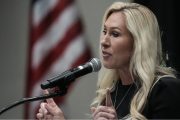Despite assertions from Federal Reserve officials that the United States would not play a role in bailing out European banks, that is exactly what has happened — again.
Earlier in the month, Federal Reserve Chairman Ben Bernanke (left) told the U.S. Senate that the Fed had no intention of bailing out the European banks, indicating that he “doesn’t have the intention or the authority” to do so.
Senator Bob Corker (R-Tenn.) said Bernanke made it “very clear” in closed door comments that the central bank would not be rescuing European financial institutions. “People walk away knowing he has no intentions whatsoever of furthering U.S. involvement in the crisis,” Corker said.
As it turns out, however, the Fed is in fact doing just that. The Wall Street Journal reports:
The Fed is using what is termed a “temporary U.S. dollar liquidity swap arrangement” with the European Central Bank (ECB). There are similar arrangements with the central banks of Canada, England, Switzerland and Japan. Simply put, the Fed trades or “swaps” dollars for euros. The Fed is compensated by payment of an interest rate (currently 50 basis points, or one-half of 1%) above the overnight index swap rate. The ECB, which guarantees to return the dollars at an exchange rate fixed at the time the original swap is made, then lends the dollars to European banks of its choosing.
The Journal outlines the reason for such secrecy:
Why are the Fed and the ECB doing this? The Fed could, after all, lend directly to U.S. branches of foreign banks. It did a great deal of lending to foreign banks under various special credit facilities in the aftermath of Lehman’s collapse in the fall of 2008. Or, the ECB could lend euros to banks and they could purchase dollars in foreign-exchange markets. The world is, after all, awash in dollars.
The two central banks are engaging in this roundabout procedure because each needs a fig leaf. The Fed was embarrassed by the revelations of its prior largess with foreign banks. It does not want the debt of foreign banks on its books. A currency swap with the ECB is not technically a loan.
GOP presidential contender Rep. Ron Paul, a staunch Federal Reserve critic, pointed out:
The Fed’s latest actions in cooperating with foreign central banks to undertake liquidity swaps of dollars for foreign currencies is another reason why Congress needs enhanced power to oversee and audit the Fed. Under current law Congress cannot examine these types of agreements. Those who would argue that auditing the Fed or these agreements with central banks harms the Fed’s independence should reevaluate the Fed’s supposed independence when the Fed bails out Europe so soon after President Obama promised US assistance in resolving the Euro crisis.
Once again the Fed’s actions highlight the problems associated with fiat money, as Paul observed: “Fiat money caused this European crisis and the financial crisis before it. More fiat money is not the cure. The global fiat currency system has proven itself a failure. We need real monetary reform. We need sound money.”
Still, even as Bernanke asserted he would not lend money to bail out European banks, there were indications that he somehow felt the United States had a vested interest in doing so. He stated that he was “very concerned” about the situation in Europe.
Senator Orrin Hatch (R-Utah) commented of Bernanke, “He did say if they can’t get their thing in order it could affect us. He said a collapse over there would be detrimental to us.” Hatch went on to assert he was confident in how Bernanke would handle the situation.
But observers say that because Bernanke knew that a public bailout of European banks would not be well received, he went about it in a roundabout way.
It’s worth noting that the Federal Reserve has already garnered a reputation for secrecy. Bloomberg News was compelled to sue the Fed in order to obtain information on its emergency programs during the 2007-09 financial crisis, though Bloomberg did exclude foreign-currency liquidity swaps because names of the commercial banks which borrowed under that program were already disclosed.
The Fed’s dealings have often been the subject of great secrecy. During a March 2009 Senate budget meeting, when Bernanke was asked by Sen. Bernie Sanders (D-Vt.) what the Fed has been doing with the American people’s money, he sidestepped the question.
Sanders said:
We have spent a lot of time in Congress talking about the $700 billion TARP bailout … not a whole lot has been talked about with regard to the $2.2 trillion that the Fed has lent out. Now I find that absolutely extraordinary that I wrote you a letter and I said, “Hey, who did you lend the money to? What were the terms of those loans? How can my constituents in Vermont get some of that money? Who makes the decisions? Do you guys sit around in a room? Do you make it? Are there conflicts of interest?: So my question to you is, will you tell the American people to whom you lent $2.2 trillion of their dollars? Will you tell us who got that money and what the terms are of those agreements?
To which Bernanke responded, “Any bank that has access to the U.S. Federal Reserve system.”
Sanders asked for the names of the banks, but Bernanke refused to submit any because he claimed it “is counterproductive and will destroy the value of the program … banks will not come to the Federal Reserve.”
Sanders grew angry at that response and said, “Well isn’t that too bad. In other words, they took the money, but they don’t want to be public about who received it.”
The dialogue continued for several minutes, but in the end, no specific information regarding the exchanges between the Federal Reserve and the recipients of its funds was revealed.
It is because of this secrecy and the unconstitutional and detrimental actions of the Federal Reserve that Ron Paul has led the movement to audit the Fed, a movement that has gained momentum and popularity. On February 26, 2009, Paul introduced H.R. 1207, the bill to audit the Federal Reserve, declaring:
I rise to introduce the Federal Reserve Transparency Act. Throughout its nearly 100-year history, the Federal Reserve has presided over the near-complete destruction of the United States dollar. Since 1913 the dollar has lost over 95% of its purchasing power, aided and abetted by the Federal Reserve’s loose monetary policy. How long will we as a Congress stand idly by while hard-working Americans see their savings eaten away by inflation? Only big-spending politicians and politically favored bankers benefit from inflation.
That bill has managed to attract 320 co-sponsors in the House, and the Senate version of the bill, S. 604, has garnered 32.





